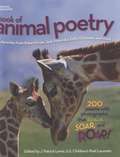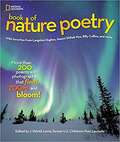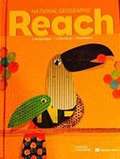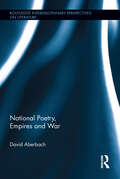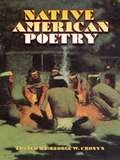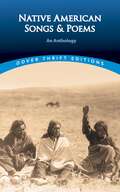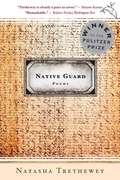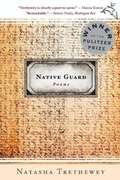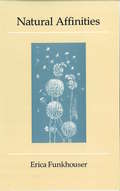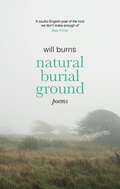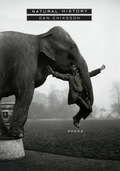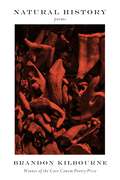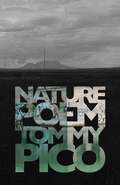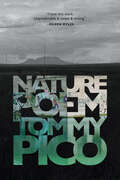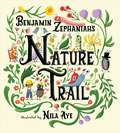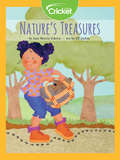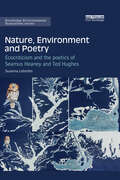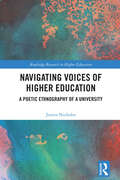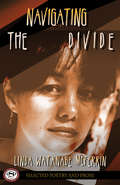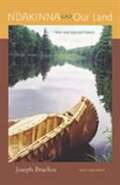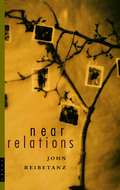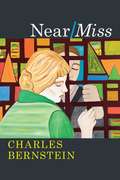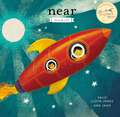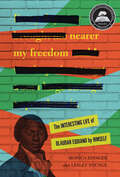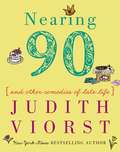- Table View
- List View
National Geographic Book of Animal Poetry: 200 Poems With Photographs That Squeak, Soar, and Roar!
by J. Patrick LewisNamed one of the Best Children's Books of 2012 by Kirkus Reviews! Named one of the top Children's Books of 2012 by the New York Public Library! "Add a little natural wonder to your poetry shelves. Because if we're talking about the best possible compliment to your eyes and ears alike, few have as many perks and grand moments as this. " --School Library Journal starred review "Out of a windless August night/A luna moth in ghostly light Beat softly on my window screen/Tick-tick-ticking-all silver green. She whispered secrets in my ear--/I am but a stranger here. The stars are scrawled across the sky/By ghostwriters, the Moon and I. You will not see me here tonight--/I have a thousand stars to write. " What could be better than cuddling up with your child and this book on your lap and allowing your imaginations to soar with the words and images? Lovingly selected by U. S. Children's Poet Laureate J. Patrick Lewis and paired with vibrant animal photography, this collection of poems is an exuberant celebration of the animal kingdom and a beautiful introduction to this genre of literature. Designed for family sharing but targeted to ages 4-8, this dynamic, fresh, yet still classic collection of animal poems is a must-have for the family bookshelf. Featured poets include J. Patrick Lewis, Dorothy Aldis, Emily Dickinson, Benjamin Franklin, Robert Frost, Rudyard Kipling, Jack Prelutsky, Elizabeth Madox Roberts, Robert Louis Stevenson, Alfred, Lord Tennyson, and many more. Divided into chapters that group the poems by theme for extra resonance, the collection is a mix of old and new, classics, and never-before-published. A foreword from Lewis, sets the scene for helping children appreciate this gift of language and this visual feast for the eyes. Chapters include: Welcome to the World (birth of animal young) Big Ones (large animals--elephants, hippos, rhinos, bears) Little Ones (small animals--worms, insects) Winged Ones (birds and other flying creatures) Water Ones (aquatic animals--fish, dolphins, crabs) Strange Ones (curious creatures--armadillos, centipedes) Noisy Ones (loud animals--lions, hyenas) Quiet Ones (silent or still animals--hens, rabbits, snakes) Last Thought (a reflection on the world we share with animals)
National Geographic Kids Book Of Nature Poetry: More Than 200 Poems With Photographs That Float, Zoom, And Bloom!
by J. Patrick Lewis National Geographic KidsWhen words in verse are paired with the awesomeness of nature, something magical happens! Beloved former U.S. Poet Laureate J. Patrick Lewis curates an exuberant poetic celebration of the natural world in this stellar collection of nature poems. From trickling streams to deafening thrunderstorms to soaring mountains, discover majestic photography perfectly paired with contemporary (such as Billy Collins), classics (such as Robert Frost), and never-before-published works.
National Geographic Reach: Language, Literacy, Content
by Deborah J. Short Sylvia Linan-Thompson Lada Kratky Nonie K. Lesaux Nancy Frey Jennifer D. TurnerNational Poetry, Empires and War (Routledge Interdisciplinary Perspectives on Literature)
by David AberbachNationalism has given the world a genre of poetry bright with ideals of justice, freedom and the brotherhood of man, but also, at times, burning with humiliation and grievance, hatred and lust for revenge, driving human kind, as the Austrian poet Grillparzer put it, ‘From humanity via nationality to bestiality’. National Poetry, Empires and War considers national poetry, and its glorification of war, from ancient to modern times, in a series of historical, social and political perspectives. Starting with the Hebrew Bible and Homer and moving through the Crusades and examples of subsequent empires, this book has much on pre-modern national poetry but focuses chiefly on post-1789 poetry which emerged from the weakening and collapse of empires, as the idealistic liberalism of nationalism in the age of Byron, Whitman, D’Annunzio, Yeats, Bialik, and Kipling was replaced by darker purposes culminating in World War I and the rise of fascism. Many national poets are the subject of countless critical and biographical studies, but this book aims to give a panoramic view of national poetry as a whole. It will be of great interest to any scholars of nationalism, Jewish Studies, history, comparative literature, and general cultural studies.
Native American Poetry
by George W. CronynThis pioneering book was the first to recognize Native American oral verse as a vibrant part of North American literature. First published in 1918, its ancient and modern songs were translated by the era's leading scholars and poets. The depth of its authenticity is matched by the scope of its variety, which covers both personal and ceremonial life.All of North America's major tribes are represented here. Traditional poems from people of the Eastern Woodlands, the Southeast, the Great Plains, the Southwest, California, the Northwest Coast, and the Far North include songs of the Iroquois, Cherokee, Comanche, Navajo, Eskimo, and others. Celebrating life's joys and sorrows in both the spirit and the flesh, this collection includes work songs, game songs, songs of suffering and love, and songs of birth, death, battle, and vision.
Native American Songs and Poems: An Anthology (Dover Thrift Editions: Poetry Ser.)
by Brian SwannWonderful collection of authentic traditional songs and contemporary Indian verse composed by Seminole, Hopi, Navajo, Pima, Arapaho, Paiute, Nootka, other Indian writers and poets. Topics include nature's beauty and rhythms, themes of tradition and continuity, the Indian in contemporary society, much more.
Native Guard: Poems
by Natasha TretheweyWinner of the 2007 Pulitzer Prize for poetry, Natasha Trethewey's elegiac Native Guard is a deeply personal volume that brings together two legacies of the Deep South.The title of the collection refers to the Mississippi Native Guards, a black regiment whose role in the Civil War has been largely overlooked by history. As a child in Gulfport, Mississippi, in the 1960s, Trethewey could gaze across the water to the fort on Ship Island where Confederate captives once were guarded by black soldiers serving the Union cause. The racial legacy of the South touched Trethewey's life on a much more immediate level, too. Many of the poems in Native Guard pay loving tribute to her mother, whose marriage to a white man was illegal in her native Mississippi in the 1960s. Years after her mother's tragic death, Trethewey reclaims her memory, just as she reclaims the voices of the black soldiers whose service has been all but forgotten.Included in this beautiful new edition of Native Guard is an audio CD of the poems read by the author -- a lovely gift for anyone who loves poetry that speaks to the heart and mind.
Native Guard: Poems
by Natasha TretheweyWinner of the 2007 Pulitzer Prize for Poetry Former U.S. Poet Laureate, Natasha Trethewey’s Native Guard is a deeply personal volume that brings together two legacies of the Deep South.Through elegaic verse that honors her mother and tells of her own fraught childhood, Natasha Trethewey confronts the racial legacy of her native Deep South—--where one of the first black regiments, The Louisiana Native Guards, was called into service during the Civil War.The title of the collection refers to the black regiment whose role in the Civil War has been largely overlooked by history. As a child in Gulfport, Mississippi, in the 1960s, Trethewey could gaze across the water to the fort on Ship Island where Confederate captives once were guarded by black soldiers serving the Union cause.The racial legacy of the South touched Trethewey’s life on a much more immediate level, too. Many of the poems in Native Guard pay loving tribute to her mother, whose marriage to a white man was illegal in her native Mississippi in the 1960s. Years after her mother’s tragic death, Trethewey reclaims her memory, just as she reclaims the voices of the black soldiers whose service has been all but forgotten.Trethewey's resonant and beguiling collection is a haunting conversation between personal experience and national history.
Natural Affinities
by Erica Funkhouser"Erica Funkhouser brings a new and inventive voice to contemporary American poetry.... Her vision, natural and honest, combined with the canny sophistication of a devoted poet, identifies the natural affinities that bridge the inner world of the imagination with the world of nature."--Ruth Whitman
Natural Burial Ground
by Will Burns'Will Burns is a soulful English poet of the kind we don't make enough of' Max PorterIn his beautiful, evocative new collection, Natural Burial Ground, Will Burns explores his deep interest in place and the natural world to excavate the emotional impact of grief and loss. Natural Burial Ground is by turns melancholy and musical, haunting and deeply empathetic, a collection that wrestles with the scope and heft of elegy, while retaining the poet's world-weary humour and range of imagery.There is throughout a sense of 'home' as unsettled, or unsettling - the landscapes of the Home Counties and of the Channel Islands - the very concept of islands themselves, becoming changed, haunted, in the wake of human experience.Time seeps into the soil of Natural Burial Ground. Reckoning with profound grief, and a country rife with 'Restrictions, recriminations . . .' - the poet finds the past visible everywhere on these grounds, where places come loaded with meaning across time - the deep past of archaeology, the weight of the personal-present, the reticent, uncertain future.In poems alive with familiar wildlife and the communities they move among - seabirds on the wing, the fishermen's daily catch - Natural Burial Ground speaks to our connections to landscapes, to family, the impact of climate change, pop music, wildlife and history.
Natural History
by Dan ChiassonDan Chiasson, hailed as "one of the most gifted poets of his generation" upon the appearance of his first book, takes inspiration for his stunning new collection from the Historia Naturalis of Pliny the Elder. "What happens next, you won't believe," Chiasson writes in "From the Life of Gorky," and it is fair warning. This collection suggests that a person is like a world, full of mysteries and wonders-and equally in need of an encyclopedia, a compendium of everything known. The long title sequence offers entries such as "The Sun" ("There is one mind in all of us, one soul, / who parches the soil in some nations / but in others hides perpetually behind a veil"), "The Elephant" ("How to explain my heroic courtesy?"), "The Pigeon" ("Once startled, you shall feel hours of weird sadness / afterwards"), and "Randall Jarrell" ("If language hurts you, make the damage real"). The mysteriously emotional individual poems coalesce as a group to suggest that our natural world is populated not just by fascinating creatures-who, in any case, are metaphors for the human as Chiasson considers them- but also by literature, by the ghosts of past poetries, by our personal ghosts. Toward the end of the sequence, one poem asks simply, "Which Species on Earth Is Saddest?" a question this book seems poised to answer. But Chiasson is not finally defeated by the sorrows and disappointments that maturity brings. Combining a classic, often heartbreaking musical line with a playful, fresh attack on the standard materials of poetry, he makes even our sadness beguiling and beautiful.From the Hardcover edition.
Natural History: Poems
by Brandon KilbourneA unique work of science and poetry, winner of the Cave Canem Prize, selected by Natasha TretheweyA research biologist most recently at the Museum für Naturkunde in Berlin, Brandon Kilbourne illuminates the intersections between science and poetry in poems that demonstrate the wonder, curiosity, and precision required by both disciplines. Natural History opens by confronting the hidden histories within the study of biology and its links to colonialism, including the revelation that European scientists used slave ships to transport specimens from Africa and the Americas back to Europe. Across the collection, Kilbourne describes how these histories of exploitation are still reflected in dioramas of elephants, rhinoceroses, and African people displayed in natural history museums. Other poems narrate the intricate work of studying fossils, and a longer sequence recounts an expedition above the Arctic Circle to recover evidence of how a fish’s fins gave rise to the diversity of limbs found among amphibians, reptiles, birds, and mammals.Natural History is a rare and fascinating debut, and Kilbourne’s exquisite eye brings the role of the working biologist to life.
Nature Poem
by Tommy Pico<P>Nature Poem follows Teebs--a young, queer, American Indian (or NDN) poet--who can't bring himself to write a nature poem.<P> For the reservation-born, urban-dwelling hipster, the exercise feels stereotypical, reductive, and boring. He hates nature. He prefers city lights to the night sky.<P> He'd slap a tree across the face. <P>He'd rather write a mountain of hashtag punchlines about death and give head in a pizza-parlor bathroom; he'd rather write odes to Aretha Franklin and Hole.<P> While he's adamant--bratty, even--about his distaste for the word "natural," over the course of the book we see him confronting the assimilationist, historical, colonial-white ideas that collude NDN people with nature.<P> The closer his people were identified with the "natural world," he figures, the easier it was to mow them down like the underbrush. <P>But Teebs gradually learns how to interpret constellations through his own lens, along with human nature, sexuality, language, music, and Twitter. <P>Even while he reckons with manifest destiny and genocide and centuries of disenfranchisement, he learns how to have faith in his own voice.
Nature Poem
by Tommy PicoA book-length poem about how an American Indian writer can’t bring himself to write about nature, but is forced to reckon with colonial-white stereotypes, manifest destiny, and his own identity as an young, queer, urban-dwelling poet. A Best Book of the Year at BuzzFeed, Interview, and more. Nature Poem follows Teebs—a young, queer, American Indian (or NDN) poet—who can’t bring himself to write a nature poem. For the reservation-born, urban-dwelling hipster, the exercise feels stereotypical, reductive, and boring. He hates nature. He prefers city lights to the night sky. He’d slap a tree across the face. He’d rather write a mountain of hashtag punchlines about death and give head in a pizza-parlor bathroom; he’d rather write odes to Aretha Franklin and Hole. While he’s adamant—bratty, even—about his distaste for the word “natural,” over the course of the book we see him confronting the assimilationist, historical, colonial-white ideas that collude NDN people with nature. The closer his people were identified with the “natural world,” he figures, the easier it was to mow them down like the underbrush. But Teebs gradually learns how to interpret constellations through his own lens, along with human nature, sexuality, language, music, and Twitter. Even while he reckons with manifest destiny and genocide and centuries of disenfranchisement, he learns how to have faith in his own voice.
Nature Trail: A joyful rhyming celebration of the natural wonders on our doorstep
by Benjamin ZephaniahA joyful celebration of nature and the wonder of the world around us by legendary poet and performer Benjamin Zephaniah, one of The Times' top 50 British post-war writers.At the bottom of my garden, there's a hedgehog and a frog,And a lot of creepy-crawlies living underneath a log . . .All around us, from parks to gardens and flowerpots to pavements, there's a world of wonder just waiting to be discovered. Why not look a little closer and see what you find?This joyful celebration of nature reminds us all to take a closer look at the world around us, and enjoy the wonder of nature wherever we find it. Packed with animals and minibeasts galore, this imaginative rhyming text is perfect for reading aloud.
Nature's Treasures
by Jane Morris UdovicA young girl learns about the wonders of nature in this rhyming poem.
Nature, Environment and Poetry: Ecocriticism and the poetics of Seamus Heaney and Ted Hughes (Routledge Environmental Humanities)
by Susanna LidströmThe environmental challenges facing humanity in the twenty-first century are not only acute and grave, they are also unprecedented in kind, complexity and scope. Nonetheless, or therefore, the political response to problems such as climate change, biodiversity loss and widespread pollution continues to fall short. To address these challenges it seems clear that we need new ways of thinking about the relationship between humans and nature, local and global, and past, present and future. One place to look for such new ideas is in poetry, designed to contain multiple levels of meaning at once, challenge the imagination, and evoke responses that are based on something more than scientific consensus and rationale. <P><P> This ecocritical book traces the environmental sensibilities of two Anglophone poets; Nobel Prize-winner Seamus Heaney (1939-2013), and British Poet Laureate Ted Hughes (1930-1998). Drawing on recent and multifarious developments in ecocritical theory, it examines how Hughes's and Heaney's respective poetics interact with late twentieth century developments in environmental thought, focusing in particular on ideas about ecology and environment in relation to religion, time, technology, colonialism, semiotics, and globalisation. <P><P> This book is aimed at students of literature and environment, the relationship between poetry and environmental humanities, and the poetry of Ted Hughes or Seamus Heaney
Navigating Voices of Higher Education: A Poetic Ethnography of a University (Routledge Research in Higher Education)
by Justin NicholesThis fascinating book comprises a poetic ethnography, featuring poems that capture the experiences of students, professors, administrators, custodians, a chancellor, and other people who work in institutions of US higher education.Using established poetic research methods, it invites readers to consider various points of view, while providing granular, concrete insight into working life at a US university. Across the volume, participants’ interviews are analyzed through a lens of embodied cognition to explore the physical experiences and metaphors that university workers use when discussing their roles and lives. The result is a truly innovative and multilayered look at the lived experiences and emotions of individuals within the university setting, as well as the sense of community that comes from inhabiting the same social and physical spaces.A vivid ethnographic picture of academic culture, this volume will appeal to qualitative and arts-based researchers, students, academic staff, as well as anyone interested in understanding more about the university experience through poetic ethnography.
Navigating the Divide: Poetry & Prose (Legacy Series)
by Linda Watanabe McFerrinNavigating the Divide: Selected Poetry and Prose is a career-spanning, multi-genre collection from the award-winning Asian-American writer and indie lit legend Linda Watanabe McFerrin. In poetry and prose that is sometimes profoundly personal, sometimes astoundingly surreal, this world traveler and devoted literary explorer breaks down walls, bridges, cultures, and genres, delighting and instructing the reader. This rich, multi-faceted collection really does "navigate the divide" between spiritual and physical, between thought and desire, between identity and others.
Ndakinna -- Our Land: New and Selected Poems
by Joseph BruchacWritten over a period of twelve years and published in magazines and anthologies, these beautiful poems of place and Abenaki Indian heritage are addressed to the land, to the poet's two sons James and Jesse, to his wife Carol, and to himself.
Near Relations: Poems
by John ReibetanzIn John Reibetanz’s tightly crafted new collection of poems, poetry and narrative are united with astonishing power and beauty. The collection first probes pivotal moments in the lives of his family, leading to a haunting prose memoir of the journey to his dying mother that recalls a “nomadic childhood” in flight from his mother’s withdrawal into illness, his adult secession from an America bent on war, then emigration to a more accommodating country. Following the same creative urge celebrated in his father-in-law’s cooking and the blues of Louis Armstrong, the poems then move into a world of intersecting fictional relations, unfolding an extraordinary range of characters. Their dilemmas are not solved but contained in luminous poems, at once spare and ample, whose clarity is born of precision. In these poem-stories of love, loss, and recovery, darkness often serves to intensify the light. Near Relations is the work of a poet compassionately engaged with the world, and one of our most accomplished lyric voices.
Near/Miss
by Charles BernsteinPraised in recent years as a “calculating, improvisatory, essential poet” by Daisy Fried in the New York Times, and as “the foremost poet-critic of our time” by Craig Dworkin, Charles Bernstein is a leading voice in American poetry. Near/Miss, Bernstein’s first poetry collection in five years, is the apotheosis of his late style, thick with off-center rhythms, hilarious riffs, and verbal extravagance. This collection’s title highlights poetry’s ability to graze reality without killing it, and at the same time implies that the poems themselves are wounded by the grief of loss. The book opens with a rollicking satire of difficult poetry—proudly declaring itself “a totally inaccessible poem”—and moves on to the stuff of contrarian pop culture and political cynicism—full of malaprops, mondegreens, nonsequiturs, translations of translations, sardonically vandalized signs, and a hilarious yet sinister feed of blog comments. At the same time, political protest also rubs up against epic collage, through poems exploring the unexpected intimacies and continuities of “our united fates.” These poems engage with works by contemporary painters—including Amy Sillman, Rackstraw Downes, and Etel Adnan—and echo translations of poets ranging from Catullus and Virgil to Goethe, Cruz e Souza, and Kandinsky. Grounded in a politics of multiplicity and dissent, and replete with both sharp edges and subtle intimacies, Near/Miss is full of close encounters of every kind.
Near: Psalm 139
by Sally Lloyd-JonesFrom the author of the bestselling The Jesus Storybook Bible, Sally Lloyd-Jones, comes an uplifting new message for children. Inspired by Psalm 139—which begins, &“O Lord, you have searched me and you know me&”—the lyrical text reminds little ones that God is with them anywhere they go in God&’s wide world.God is my Father who made everything.And I am a little explorer of the wide world.He is near meAnd he protects me.He sees meAnd he knows me.He is strongAnd he looks after me. He is with me—always!An inspirational, Bible-based board book, Near:is written by Sally Lloyd-Jones, the bestselling author of The Jesus Storybook Biblepresents lyrical text inspired by Psalm 139delivers a reassuring message that calms kids&’ nerves, soothes their anxieties, and eases their fearsfeatures a soft padded format that is a perfect fit for little handsis a great gift for a new baby, First Communion, Christmas or birthdayThe board book offers a soft, padded format, a perfect fit for little hands.Look for additional inspirational children&’s picture books in the series inspired by The Jesus Storybook Bible:Loved: The Lord&’s PrayerFound: Psalm 23Near is another resource to invite children to experience God&’s Never Stopping, Never Giving Up, Unbreaking, Always and Forever Love.
Nearer My Freedom: The Interesting Life of Olaudah Equiano by Himself
by Monica Edinger Lesley YoungeMillions of Africans were enslaved during the transatlantic slave trade, but few recorded their personal experiences. Olaudah Equiano's The Interesting Narrative of the Life of Olaudah Equiano is perhaps the most well known of the autobiographies that exist. Using this narrative as a primary source text, authors Monica Edinger and Lesley Younge share Equiano's life story in "found verse," supplemented with annotations to give readers historical context. This poetic approach provides interesting analysis and synthesis, helping readers to better understand the original text. Follow Equiano from his life in Africa as a child to his enslavement at a young age, his travels across the Atlantic Ocean and Mediterranean Sea, his liberation, and his life as a free man.
Nearing Ninety: And Other Comedies of Late Life (Judith Viorst's Decades)
by Judith ViorstThe newest illustrated poetry collection in beloved author Judith Viorst’s “decade” series (from It’s Hard to Be Hip Over Thirty to Unexpectedly Eighty), exploring, with her signature savvy and humor, what it means to be an impending nonagenarian.In Nearing Ninety, bestselling author Judith Viorst candidly shares the complicated joys and everyday tribulations that await us at the age of ninety, all with a large dose of humor and an understanding that nothing—well, almost nothing—in life should be taken too seriously. While she struggles to make it to midnight on New Year's Eve, while she’s starting to hear more eulogies than symphonies, while she’ll forever be disheartened by what she weighs (and forever unable to stop weighing herself), there is plenty to cherish at ninety: hanging out with the people she loves. Playing a relentless game of Scrabble. And still sleeping tush-to-tush with the same man to whom she’s been married for sixty years. Accompanied by Laura Gibson’s whimsical illustrations, Nearing Ninety’s amusing and touching reflections make this collection relatable to readers of all ages. With the wisdom and spunk of someone who’s seen it all, Viorst gently reminds us that everybody gets old, and that the best medicine at any age is laughter.
